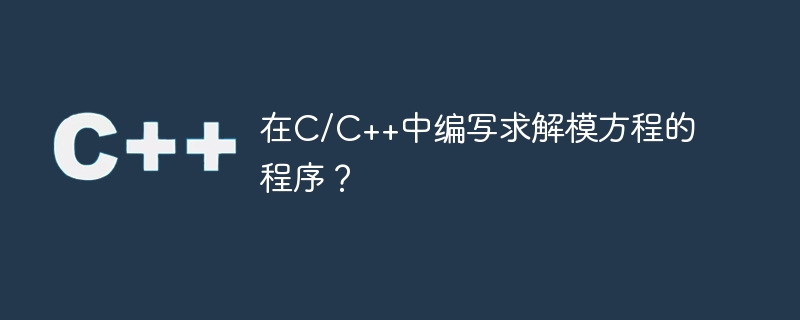Heim >Backend-Entwicklung >C++ >Ein Programm zum Lösen modularer Gleichungen in C/C++ schreiben?
Ein Programm zum Lösen modularer Gleichungen in C/C++ schreiben?
- WBOYWBOYWBOYWBOYWBOYWBOYWBOYWBOYWBOYWBOYWBOYWBOYWBnach vorne
- 2023-09-12 14:21:031328Durchsuche

Hier sehen wir ein interessantes Problem im Zusammenhang mit modularen Gleichungen. Nehmen wir an, wir haben zwei Werte A und B. Wir müssen die Anzahl möglicher Werte ermitteln, die die Variable X annehmen kann, sodass (A mod X) = B gilt.
Angenommen, A ist 26 und B ist 2. Der bevorzugte Wert von X ist also {3, 4, 6, 8, 12, 24}, daher beträgt die Anzahl 6. Das ist die Antwort. Werfen wir einen Blick auf den Algorithmus, um ihn besser zu verstehen.
Algorithm
possibleWayCount(a, b) −
begin if a = b, then there are infinite solutions if a < b, then there are no solutions otherwise div_count := find_div(a, b) return div_count end
find_div(a, b) – Die chinesische Übersetzung von
begin
n := a – b
div_count := 0
for i in range 1 to square root of n, do
if n mode i is 0, then
if i > b, then
increase div_count by 1
end if
if n / i is not same as i and (n / i) > b, then
increase div_count by 1
end if
end if
done
endExample
lautet:Example
#include <iostream>
#include <cmath>
using namespace std;
int findDivisors(int A, int B) {
int N = (A - B);
int div_count = 0;
for (int i = 1; i <= sqrt(N); i++) {
if ((N % i) == 0) {
if (i > B)
div_count++;
if ((N / i) != i && (N / i) > B) //ignore if it is already counted
div_count++;
}
}
return div_count;
}
int possibleWayCount(int A, int B) {
if (A == B) //if they are same, there are infinity solutions
return -1;
if (A < B) //if A < B, then there are two possible solutions
return 0;
int div_count = 0;
div_count = findDivisors(A, B);
return div_count;
}
void possibleWay(int A, int B) {
int sol = possibleWayCount(A, B);
if (sol == -1)
cout << "For A: " << A << " and B: " << B << ", X can take infinite values greater than " << A;
else
cout << "For A: " << A << " and B: " << B << ", X can take " << sol << " values";
}
int main() {
int A = 26, B = 2;
possibleWay(A, B);
}Output
For A: 26 and B: 2, X can take 6 values
Das obige ist der detaillierte Inhalt vonEin Programm zum Lösen modularer Gleichungen in C/C++ schreiben?. Für weitere Informationen folgen Sie bitte anderen verwandten Artikeln auf der PHP chinesischen Website!

